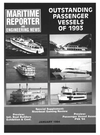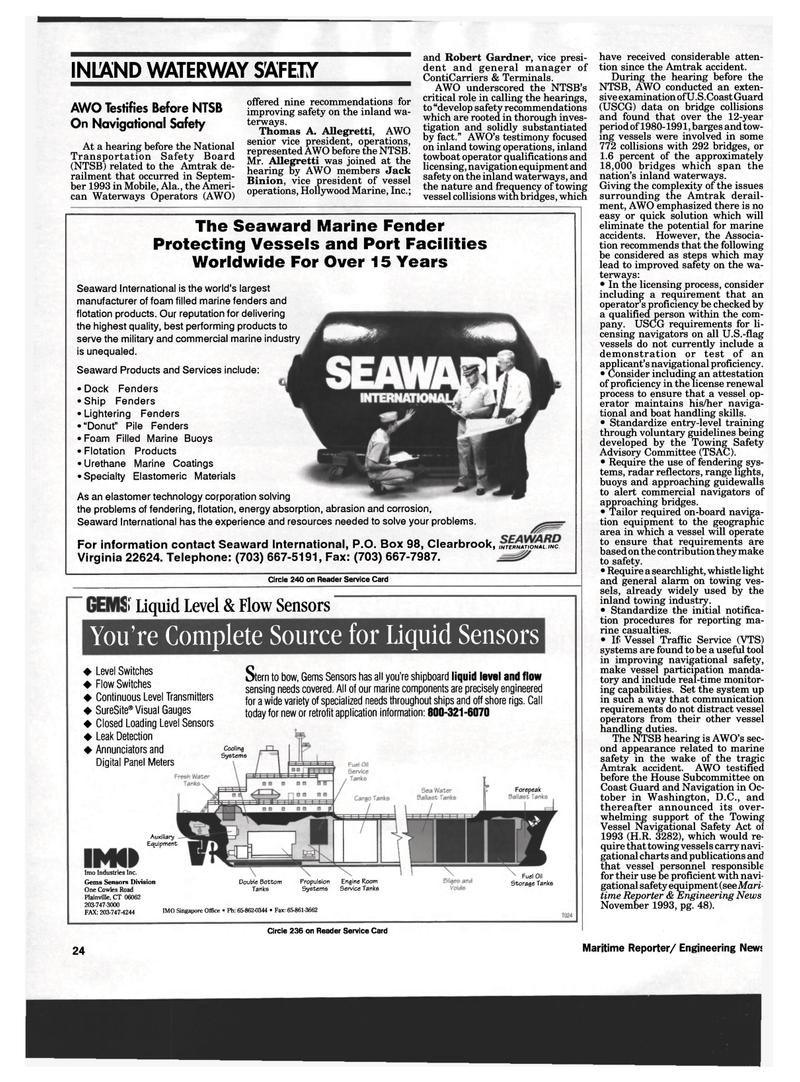
Page 22: of Maritime Reporter Magazine (January 1994)
Read this page in Pdf, Flash or Html5 edition of January 1994 Maritime Reporter Magazine
INLAND WATERWAY SAFETY
AWO Testifies Before NTSB
On Navigational Safety
At a hearing before the National
Transportation Safety Board (NTSB) related to the Amtrak de- railment that occurred in Septem- ber 1993 in Mobile, Ala., the Ameri- can Waterways Operators (AWO) offered nine recommendations for improving safety on the inland wa- terways.
Thomas A. Allegretti, AWO senior vice president, operations, represented AWO before the NTSB.
Mr. Allegretti was joined at the hearing by AWO members Jack
Binion, vice president of vessel operations, Hollywood Marine, Inc.; and Robert Gardner, vice presi- dent and general manager of
ContiCarriers & Terminals.
AWO underscored the NTSB's critical role in calling the hearings, to "develop safety recommendations which are rooted in thorough inves- tigation and solidly substantiated by fact." AWO's testimony focused on inland towing operations, inland towboat operator qualifications and licensing, navigation equipment and safety on the inland waterways, and the nature and frequency of towing vessel collisions with bridges, which have received considerable atten- tion since the Amtrak accident.
During the hearing before the
NTSB, AWO conducted an exten- sive examination ofU.S.Coast Guard (USCG) data on bridge collisions and found that over the 12-year period of1980-1991, barges and tow- ing vessels were involved in some 772 collisions with 292 bridges, or 1.6 percent of the approximately 18,000 bridges which span the nation's inland waterways.
Giving the complexity of the issues surrounding the Amtrak derail- ment, AWO emphasized there is no easy or quick solution which will eliminate the potential for marine accidents. However, the Associa- tion recommends that the following be considered as steps which may lead to improved safety on the wa- terways: • In the licensing process, consider including a requirement that an operator's proficiency be checked by a qualified person within the com- pany. USCG requirements for li- censing navigators on all U.S.-flag vessels do not currently include a demonstration or test of an applicant's navigational proficiency. • Consider including an attestation of proficiency in the license renewal process to ensure that a vessel op- erator maintains his/her naviga- tional and boat handling skills. • Standardize entry-level training through voluntary guidelines being developed by the Towing Safety
Advisory Committee (TSAC). • Require the use of fendering sys- tems, radar reflectors, range lights, buoys and approaching guidewalls to alert commercial navigators of approaching bridges. • Tailor required on-board naviga- tion equipment to the geographic area in which a vessel will operate to ensure that requirements are based on the contribution they make to safety. • Require a searchlight, whistle light and general alarm on towing ves- sels, already widely used by the inland towing industry. • Standardize the initial notifica- tion procedures for reporting ma- rine casualties. • If Vessel Traffic Service (VTS) systems are found to be a useful tool in improving navigational safety, make vessel participation manda- tory and include real-time monitor- ing capabilities. Set the system up in such a way that communication requirements do not distract vessel operators from their other vessel handling duties.
The NTSB hearing is AWO's sec- ond appearance related to marine safety in the wake of the tragic
Amtrak accident. AWO testified before the House Subcommittee on
Coast Guard and Navigation in Oc- tober in Washington, D.C., and thereafter announced its over- whelming support of the Towing
Vessel Navigational Safety Act ol 1993 (H.R. 3282), which would re- quire that towing vessels carry navi- gational charts and publications and that vessel personnel responsible for their use be proficient with navi- gational safety equipment (see Mari- time Reporter & Engineering News
November 1993, pg. 48). ! Liquid Level & Flow Sensors
You're Complete Source for Liquid Sensors • Level Switches • Flow Switches • Continuous Level Transmitters • SureSite® Visual Gauges • Closed Loading Level Sensors • Leak Detection • Annunciators and
Digital Panel Meters
Stern to bow, Gems Sensors has all you're shipboard liquid level and flow sensing needs covered. All of our marine components are precisely engineered for a wide variety of specialized needs throughout ships and off shore rigs. Call today for new or retrofit application information: 800-321-6070
Cooling
Systems
Forepeak
Auxiliary
Equipment
Imo Industries Inc.
Gems Sensors Division
One Cowles Road
Plainville, CT 06062 203-747-3000
FAX: 203-7474244
Double Bottom Propulsion Engine Room
Tanks Systems Service Tanks
Fuel Oil
Storage Tanks
IMO Singapore Office • Ph: 65-862-0344 • Fax: 65-861-3662
Circle 236 on Reader Service Card
Circle 240 on Reader Service Card
The Seaward Marine Fender
Protecting Vessels and Port Facilities
Worldwide For Over 15 Years
Seaward International is the world's largest manufacturer of foam filled marine fenders and flotation products. Our reputation for delivering the highest quality, best performing products to serve the military and commercial marine industry is unequaled.
Seaward Products and Services include: • Dock Fenders • Ship Fenders • Lightering Fenders •"Donut" Pile Fenders • Foam Filled Marine Buoys • Flotation Products • Urethane Marine Coatings • Specialty Elastomeric Materials
For information contact Seaward International, P.O. Box 98, Clearbrook, WTERNATIONAL. INC.
Virginia 22624. Telephone: (703) 667-5191, Fax: (703) 667-7987.
As an elastomer technology corporation solving the problems of fendering, flotation, energy absorption, abrasion and corrosion,
Seaward International has the experience and resources needed to solve your problems. 24 Maritime Reporter/ Engineering News

 21
21

 23
23
